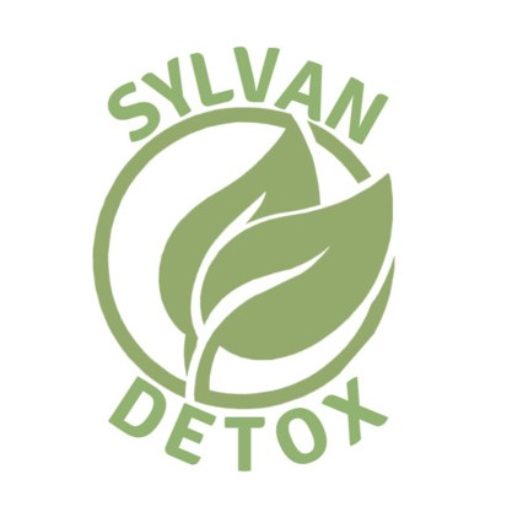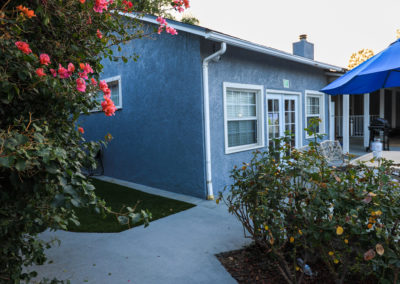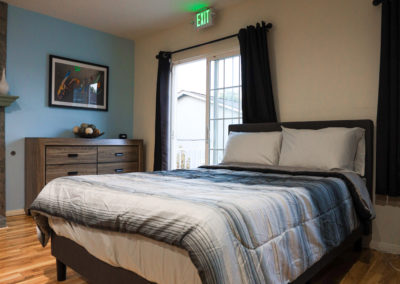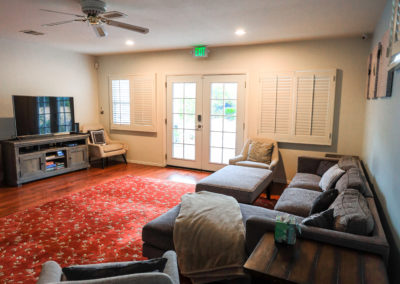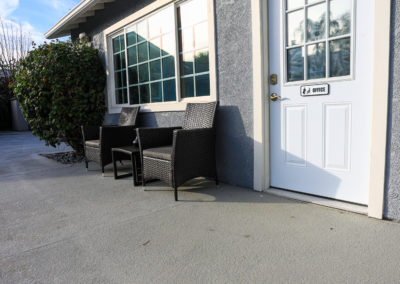Addiction Treatment Center in Beverly Hills | Detox, Rehab for Alcohol, RX, Drugs
When you have been living with an active addiction to drugs and alcohol, you have undoubtedly had thoughts about wanting to quit or, for some, you may have attempted to do so on your finding that you were unsuccessful in your attempts. This is not a reflection on you or your willingness to get sober. It merely highlights the truly addictive nature of drugs and alcohol that require an intensive level of support and care from highly trained professionals. At Sylvan Detox, our qualified team of medical professionals and clinicians along with our highly skilled addiction therapists will support you through a comprehensive treatment plan that will help you overcome the physical and psychological impacts of substance abuse while acquiring the necessary tools to maintain long-term sobriety. When you enter our rehab facility, you are no longer alone in your battle with addiction. Our compassionate team will be with you every step of the way as you embrace a future of sobriety, health, and wellness.
Table of Contents
- Why Choose Sylvan Detox
- Highest Rated Alcohol Detox Program
- Drug Detox Program
- Top Alcohol Rehab in Beverly Hills
- Drug Rehab in Beverly Hills
- How Much Does Rehab Cost in Beverly Hills?
- How Long Is Detox?
- How Long Is Rehab?
- 30 Day Short Term Rehab
- Long Term Rehab (60-90 Days)
- Additional Treatments and Addiction Treatments Available
- Does My Insurance Have Coverage for Rehab?
- MAT
- Cognitive Behavioral Therapy
- Dialectical Behavioral Therapy
- Rational Emotive Behavioral Therapy (REBT)
- Dual Diagnosis Treatment
- EDMR
- Relapse Prevention
- Life Skills Training
- Vocational Training
- Group Therapy
- Experiential Therapy
- One-on-One Therapy
- Family Therapy
- Trauma-Informed Therapy
- Physical Fitness
- Off-site Activities
- 12-Step Rehab in Los Angeles
- Anxiety Disorder
- Bipolar Disorder
- Borderline Personality Disorder
- Codependency
- Depression
- Impulse Control Disorder
- Post-Traumatic Stress Disorder
- Why Choose Sylvan Detox?
Why Choose Sylvan Detox
Your addiction is unique to you and your treatment program needs to be meaningful and centered around your specific needs and overarching goals for sobriety and recovery. When you choose to heal from addiction within Sylvan Detox, you will be offered an individualized treatment program that includes a variety of evidence-based, clinically driven therapeutic methods. We offer our patients a full continuum of care for services including medical detox programs, inpatient rehab, outpatient treatment, and aftercare programs that will enable you to heal from your addiction with the highest levels of care provided to you every step of the way. As you participate in addiction treatment methods, you will be able to enjoy a peaceful, luxurious environment that will offer you top-of-the-line services and amenities for your enjoyment, comfort, and overall healing.
Highest Rated Alcohol Detox Program
Alcohol addiction ranges in levels of severity depending on your unique history of alcohol abuse. As you attempt to quit your use of alcohol, you will experience the onset of withdrawal symptoms that have the potential of becoming dangerous if they are not monitored and treated by licensed healthcare professionals. Sylvan Detox offers a medical alcohol detox program that will provide you with around-the-clock care to ensure that your vitals and overall health remain stable. Our team of experienced physicians and nurses will offer you specific detox treatments and medications that are FDA-approved and work to reduce the severity of your symptoms while maintaining your safety and comfort. Patients will also be invited to engage in several holistic therapies that will reduce their withdrawal symptoms and work towards restoring their overall health and well-being.
Drug Detox Program
Drug addiction can come in many forms whether it be illicit substances or prescription drugs. Depending on your specific drug of choice, there are specific withdrawal symptoms associated with that substance that has the risk of becoming dangerous or, in some cases, life-threatening. The drug detox program at Sylvan Detox offers you a safe environment to undergo your detox process with ongoing medical support and guidance that will ensure you safely overcome any serious withdrawal symptoms. Our team of board-certified doctors and nurses are highly trained and experienced in safe detox practices that will ensure you are safe and will be able to offer efficient care should a rare case of a medical emergency occur. In some instances, patients may be offered the support of a medication-assisted treatment program that will provide them with FDA-approved medications that will work to reduce or eliminate the onset or severity of certain withdrawal symptoms while minimizing the presence of withdrawal symptoms. Detox can feel like an overwhelming part of your recovery journey but with the care and support of our medical team and addiction therapists, we will ensure that you get through your detox program with care and ease.
Top Alcohol Rehab in Beverly Hills
Alcohol rehab is the next step in your alcohol recovery process after completing your alcohol detox program. Now that your body and mind have released the physical alcohol dependence and you have started to restore your health, you will be in a clear state of mind to begin exploring the root causes of your alcohol addiction within a structured, evidence-based therapy plan. When you first transition into alcohol rehab, our team will complete various physical and psychological assessments that will provide enlightenment on the levels of care and specific types of treatment that will best suit you and your recovery process. From there, we will develop a personalized treatment plan that will incorporate several clinically driven therapeutic approaches and holistic therapies that will foster healing within your body, mind, and spirit from the impacts of alcohol addiction.
Drug Rehab in Beverly Hills
Drug rehab for Beverly Hills residents will offer similar structures to an alcohol rehab program. Our clinical team will evaluate your history of substance abuse and identify a personalized treatment plan that will be best suited to your individual needs and goals for recovery. As you work through your individualized treatment program, you will be offered a variety of evidence-based therapy and holistic treatments that will foster a whole-person integrated approach to healing. When you are not engaging in therapy sessions, you will be encouraged to participate in various forms of physical activity, enjoy nutritious meals prepared by our onsite chefs, and enjoy the onsite luxury amenities that will restore your body and spirit making your recovery process an enjoyable and transformational journey.
How Much Does Rehab Cost in Beverly Hills?
The cost of an addiction treatment program is based on several factors including where you chose to go to rehab, the length of time you are in rehab, specific treatments you’re offered, and the levels of care that you choose to engage in. When you call our intake specialists at Sylvan Detox, we will take the time to get to know you and your specific needs to help provide you with an estimate of the cost of your treatment program. From there, we will be able to support you in navigating resources to supplement the cost of your treatment program including through scholarships and insurance coverage or provide you with financing options that will help you begin your recovery process without financial concerns that are a barrier to your success.
How Long is Detox?
Your time in alcohol or drug detox will depend on your specific history of substance abuse. Each person will have their unique detox process and specific factors such as the type of substance that they have engaged in, how long they have been abusing drugs or alcohol, the frequency in which they use substances, and another physical or mental health diagnosis may influence the time it takes for you to successfully detox from substances. Typically, patients can move through a detox process within 7 to 10 days. When you start a detox, withdrawal symptoms will often occur within the first 24 hours and will hit the peak of symptoms within a few days. As time progresses, withdrawal symptoms will begin to subside and you will start to overcome the physical dependency and addiction to substances.
How Long is Rehab?
Each person that is going through a rehab program will have milestones and goals to achieve from their healing process. It is important that you take the time you feel is appropriate and necessary to gain the most from your time in rehab which will ensure you can have long-lasting success in addiction recovery. Our treatment programs are created to be custom designed to meet the individual needs of each patient which means that there is not a one size fits all approach to treatment and the length of time that you should be in the rehab program. Our team will work with you to establish a treatment plan and length of time that best suits you. Typically, patients will decide to engage in a 30-day, 60-day, or 90-day rehab program.
30-Day (Short-Term Rehab)
30 days is generally the minimum amount of time that a person will stay in a rehab program. During a short-term rehab program, you will be offered a personalized treatment plan that will incorporate some services and clinically driven therapies that will assist you in healing from the root causes of your addiction while establishing a new strong foundation in your recovery process. A short-term rehab program will offer patients an intensive therapy model that will enable them to overcome the initial, sometimes difficult, portion of their recovery journey allowing them to move through any cravings or withdrawals with onsite support of medical and therapeutic support. After completing a short-term rehab, patients are encouraged to continue with an outpatient treatment or aftercare program that will assist them in strengthening their skills and capacity for relapse prevention and long-term recovery.
Long-Term Rehab (60 – 90 Days)
A long-term rehab program of 60 or 90 days is often ideal for Beverly Hills residents that require specific therapy methods for severe substance use disorders, dual diagnosis treatment for co-occurring disorders, or trauma therapy. Having an extended time in drug or alcohol rehab will provide you with adequate time to break negative patterns that fuel your addiction and allow you the time to establish healthy, positive behaviors and coping skills that will support long-term success in addiction recovery. As you engage in therapeutic methods, you will have the opportunity to participate in specific life skills training, relapse prevention planning, and vocational skills that will help set you up for success in long-term sobriety.
Additional Therapies & Addiction Treatments Available
Each person with an addiction to drugs and alcohol will have their own unique healing needs from a treatment plan and to provide our patients with the best treatment plan possible, our team will devise a comprehensive treatment schedule that will foster healing and personal growth. Through our clinically driven treatment approaches, patients are supported in establishing goals and motivation for their recovery process. To achieve these goals and heal from the root causes of your addiction, you will be offered several behavioral therapies, medication-assisted treatment, EMDR, holistic treatments, and dual diagnosis treatment that will help to restore and heal your body, mind, and spirit for the impacts of addiction and foster a new way of life in health and wellness.
Does My Insurance Have Coverage for Rehab?
Health insurance companies have become mandated to include mental health and substance abuse treatments within their insurance policies and benefits. This became into effect once the Affordable Care Act came into place and recognized the need for proper medical and therapeutic treatment to manage and heal from a substance use disorder. Each insurance company will offer varying levels of coverage and benefits for addiction treatment plans. If you are unsure of the coverage offered within your specific insurance plan, our insurance and intake specialists will assist you in verifying your insurance to help you find optimal coverage for your treatment program.
Medication-Assisted Treatment (MAT)
A medically assisted treatment (MAT) program is a beneficial tool for substance abuse treatment that focuses on supporting patients in safely overcoming their physical and psychological dependence on drugs or alcohol. While you are going through our medical detox programs, you will be monitored by our onsite nurses and physicians that will assess the severity of your withdrawal symptoms and maintain optimal, healthy vitals. During this process, if you are experiencing severe withdrawals or strong cravings for substances, you may be offered the support of a MAT program where you will be able to take FDA-approved medications that work to reduce or eliminate the onset of intense withdrawal symptoms and mitigate the presence of strong cravings. As your symptoms are maintained, you will be able to fully engage in your treatment plan where you can address and heal from your underlying causes of addiction.
Cognitive Behavioral Therapy
Cognitive behavioral therapy (CBT) is a common form of psychotherapy that is utilized within addiction treatment programs. CBT places a focus on assisting patients to become aware of the negative thoughts, emotions, and behaviors that have contributed to their addictive behaviors. CBT sessions will invite patients to explore methods of breaking those negative patterns and developing strategies to replace those negative behaviors with positive, constructive tools that will foster long-term recovery.
Dialectical Behavioral Therapy
Dialectical behavioral therapy (DBT) is a form of addiction therapy that assists patients in developing the tools to be present in each moment without being sidetracked by harmful or negative thoughts or behaviors. DBT sessions use a cognitive behavioral therapy approach where patients are encouraged to explore the thoughts and actions that have led to their addictive behaviors while gaining the necessary coping skills and tools for relapse prevention that will foster long-term success in addiction recovery. DBT sessions are offered in individual or group therapy methods where patients will have the opportunity to learn skills such as managing challenging interactions or situations, having healthy interpersonal skills, tools for emotional regulation, and gaining awareness of negative thoughts and behaviors. As you establish what your unhealthy thought and behavior patterns are, DBT will provide you with tools for shifting these patterns into healthy, positive ones that foster long-term sobriety.
Rational Emotive Behavioral Therapy (REBT)
Rational emotive behavioral therapy (REBT) is a solution-focused, clinical approach to establishing healthy thought and behavioral patterns for living in addiction recovery. REBT sessions offer patients the opportunity to gain awareness of how their perceptions of others, situations, or irrational thoughts can influence their addictive behaviors. Oftentimes, negative thought patterns and beliefs will cause unnecessary stress or heightened reactions that can fuel a person’s addictive behaviors. REBT works with patients to identify those unhealthy habits and establish tools to shift those behavioral and thought patterns to healthy, positive ones that encourage sobriety and wellness.
Dual Diagnosis Treatment
For many Beverly Hills residents who are experiencing a substance use disorder, there are often underlying mental health disorders that require proper treatment and management. Having both disorders simultaneously is referred to as co-occurring disorder. To effectively treat co-occurring disorders, patients will be supported with a dual diagnosis treatment program that will provide treatments and tools for managing the symptoms of their mental health disorder through natural, holistic therapies. As you regain stability in your mental health conditions, you will be able to begin addressing and healing from the underlying causes of your addictive behaviors through evidence-based therapy methods. A dual-diagnosis treatment program provides patients with a holistic treatment approach that fosters balanced mental, physical, and spiritual health.
Eye Movement Desensitization and Reprocessing (EMDR)
Underneath many people’s addictions is deep-rooted traumas that have impacted how they interact and manage the world and day-to-day functioning. Eye movement desensitization and reprocessing (EMDR) is a form of trauma therapy that invites you to reduce the harmful trauma responses that are occurring due to past traumas, emotional wounds, and significant psychological stress. During an EMDR session, patients will be guided by their therapist to follow specific tones and tapping sounds along with eye movements from side to side that will allow them to recount their past traumas in a state of dual awareness. As you progress with these sessions, you will be able to reduce the negative associations of these memories and remove the physical or emotional responses that occur when the memory arises.
Relapse Prevention
Drug and alcohol addiction is a chronic disorder that does not have a cure but rather tools to manage it. For this reason, there is a potential that relapse can become a part of your recovery process. However, at Sylvan Detox, we work with our patients to gain awareness of what their potential triggers for relapse are, learn how to identify harmful responses and signs for relapse, and develop a plan to safely overcome triggers to remain on track for living in sobriety. Relapse prevention planning will invite patients to explore various coping skills and tools that they can utilize when triggers arise along with supports they can access when they return home such as 12-step recovery groups that will ensure they can remain on track for sobriety.
Life Skills Training
During the height of your addiction, your focus in life was fuelling your addiction. This meant that the opportunity to develop appropriate and necessary life skills for healthy living was often compromised. While you are in drug or alcohol rehab, our team will provide opportunities for group discussions and skill-building classes that will enable you to learn healthy, positive life skills that enhance your ability to maintain a healthy balanced life in sobriety. Patients will be able to learn life skills such as cleaning or hygiene, cooking skills, finance management, healthy communication, employment skills, developing a healthy daily routine, incorporating exercise and healthy eating within your day, and successful interpersonal skills.
Vocational Training
A healthy part of living in recovery is finding a balanced daily routine that has meaning and purpose. For many people, this includes having active employment. While in rehab, our team will provide opportunities for vocational training that will encourage you to develop the appropriate skills and tools for successful employment such as interview skills, resume building, time management, and interpersonal skills that will foster long-term employment. People in recovery have found that having employment has helped to establish independence, foster accountability, reduce the potential for financial stress, create a healthy daily routine, and support in making social connections with others within your workplace.
Group Therapy
Group therapy is a common component of any addiction treatment program. Within group therapy sessions, patients can connect with others in recovery and share their experiences, emotions, and mutual support. Addiction can often feel like a lonely place to be and group therapy is a validating and impactful experience where you get to see that you are not alone in your struggles with addiction. Each group therapy session is led by an addiction therapist that will present various topics of discussion based on addiction, recovery, and skill development that will help the group learn and grow together toward a new lifestyle in addiction recovery.
Experiential Therapy
Addiction therapy is a diverse method of healing that can be completed in various settings and formats to meet the needs of each patient. Traditional talk therapy may not be ideal for all patients and having the opportunity to engage in an active form of therapy can be the best way to explore and heal from deep-rooted emotions. Experiential therapy offers patients hands-on experiences that will allow them to complete different tasks and activities as they learn more about themselves, gain confidence, and heal from past emotional wounds. At Sylvan Detox, patients can engage in experiential therapy methods such as recreational therapy, role-playing, art or music therapy, adventure therapy, and animal-based therapy approaches. An interactive healing experience will often help reduce any feelings of apprehension about therapy and allow you to feel comfortable and relaxed as you begin exploring the root causes of your addiction.
One-on-One Therapy
Individual therapy is a key part of your recovery program. This is an opportunity for you to connect with your primary therapist who will support you with various forms of clinically driven, evidence-based therapy methods that will support you in exploring what has been at the core of your addictive behaviors while providing insight into coping mechanisms and tools that you can utilize to safely overcome triggers to remain on the path for sobriety.
Family Therapy
A common misconception about addiction is that it only impacts the person abusing substances. However, the people that are closest to the addicted person often experience difficulties and hardships that require support and care during the recovery process. Family therapy offers patients an opportunity to heal any divided or impaired relationships through guided conversations with a therapist. During family therapy, there will be opportunities for education for loved ones about the nature and impacts of addiction, establishing healthy communication and boundaries with one another, and learning how to create a supportive family unit that fosters recovery and health between all family members.
Trauma-Informed Therapy
Healing from addiction is a personal journey that requires deep introspection on your life, values, beliefs, and emotions. At Sylvan Detox, we understand that our patients have a unique history of substance abuse that often is rooted in trauma and emotional wounds. Our therapists work within a trauma-informed lens that honors your circumstances with addiction and allows you to be the one guiding your recovery process. We are cognizant of avoiding retraumatization by being aware of your potential trauma triggers and responses and offering transparency within your treatment planning and process
Physical Fitness
Addiction is a full-body disorder that impacts both your physical and psychological health. To provide optimal healing, patients are encouraged to participate in several methods of treatment that will foster healing and growth both physically and psychologically. Physical exercise is an effective method of healing within the treatment and recovery. Physical exercise helps to produce natural endorphins that offer “Feel good” emotions and responses. Patients who engage in physical exercise also notice an improvement in psychological functioning, reducing cravings, establishing structure within their life, and finding balance within their bodies and mind.
Off-Site Activities
While in treatment, you are putting hard work into your recovery process and you must be provided with time for necessary downtime to recharge and relax. Patients within Sylvan Detox are offered opportunities to attend off-site activities that will work to integrate them into the community, avoid feeling isolated within the recovery center, and begin to put the tools they are learning for relapse prevention to work within a public setting.
12-Step Rehab in Beverly Hills
12 step recoveries groups such as alcoholics anonymous or narcotics anonymous have been around for many decades and have supported millions of people in finding hope, strength, and resiliency to maintain sobriety. For many aftercare plans, patients will incorporate attending these groups as a way to stay connected to their recovery process and a network of support within 12-step meetings. While you are in rehab, you will have the opportunity to engage in 12-step programs and principles to help you become acquainted and familiar with the 12-step processes making your transition from rehab to the community smooth and easy.
Anxiety Disorder
Anxiety disorder is a mental health condition that has a significant impact on a person’s ability to maintain daily functioning. The symptoms associated with anxiety are often crippling fear that hinders your capacity to maintain your performance at work, school, social engagements, daily life, and healthy relationships. For many Americans struggling with anxiety, if you do not have the proper support and treatments available, it can be easy to turn to substances as a method of coping or self-medicating which can lead to a spiral of addiction and substance abuse. While you are in rehab, you will be offered the support of a dual-diagnosis treatment program where you can learn holistic methods of coping with anxiety and heal from the physical and psychological dependence on substances.
Bipolar Disorder
Bipolar disorder is a mental health condition that creates severe changes in mood and emotional regulation. People will often experience extreme highs and then intense lows. To treat or manage these mood swings, many will turn to substances as a way to regulate their emotions and attempt to find balance. However, substance abuse tends to exacerbate the symptoms of the bipolar disorder leading to a cycle of abuse and addiction along with instability in mental health functioning. Patients will be offered several psychotherapy methods while in dual diagnosis treatment that will help to regulate their emotional well-being, develop coping strategies for bipolar disorder, and successfully overcome any addiction to drugs or alcohol.
Borderline Personality Disorder
Borderline personality disorder (BPD) is a complex mental health disorder that impacts each person in various ways and results in changing moods, shifts in behavioral patterns, and a distorted self-image or distorted perception of the world around them. These negative beliefs and perceptions often lead to irrational or problematic behaviors both personally and within relationships. Individuals will often experience impulsive behaviors and intense emotional responses that can be hard to regulate without the proper treatment or coping tools which can lead individuals to drugs or alcohol as a way to cope. Patients with BPD will be offered psychotherapy methods, holistic treatments, and medication-assisted treatment that will work to regulate their mental health functioning while healing from the impacts of substance abuse.
Codependency
It is common for those in active addiction to be demonstrating codependent behaviors with those around them. Often this will look like the addicted person relying on a loved one or someone else to help support or foster their addictive behaviors and substance abuse and the other person attempting to support the addicted person but in actuality, they are engaging in enabling behaviors. While the person is genuine about wanting to help the addicted person, it often creates a relationship dynamic that is unhealthy and unsupportive in helping someone over addiction. When patients are in family therapy, they will be offered guidance on how to have supportive relationships that avoid codependent behaviors and foster independence, health, and sobriety.
Depression
Depression is one of the leading mental health conditions impacting Americans today. The symptoms of depression have intense, crippling effects on a person’s overall physical and psychological health along with their capacity to engage in daily living activities and functioning. When a person struggling with depression turns to substance abuse, it generally will worsen the symptoms of depression creating a cycle of substance abuse and distressing symptoms of mental health. Through the comprehensive treatment plans offered in Sylvan Detox, patients will engage in several healing methods including various forms of behavioral therapy, dual diagnosis treatment, medication-assisted treatment, and holistic or alternative treatments that will support them in healing from their addiction and developing the tools for managing symptoms of depression.
Impulse Control Disorder
Impulse control disorder affects a person’s capacity to have strong emotional regulation techniques. Oftentimes those with impulse control disorder will be unable to manage difficult emotions and avoid problematic responses or behaviors leading to hostile or violent behaviors. Substance abuse is known to cause a loss of inhibition and control and when you are engaging in substance abuse with impulse control disorder, it can lead to dangerous behaviors with serious consequences. During your rehab program, you will be invited to participate in several holistic psychotherapy methods that will support you in learning how to regulate your emotions, manage your responses and behaviors, and heal from the underlying issues associated with your addictive patterns.
Post-Traumatic Stress Disorder
After a person experiences or witnesses a highly traumatic event, there are long-lasting impacts known as post-traumatic stress disorder (PTSD). The symptoms of PTSD can make it challenging to maintain daily functioning and living including intense fear, stress, or anxiety that can be crippling. As a way to self-medicate, many will turn to substance abuse which can lead to a cycle of addiction and worsening symptoms. Patients will be provided with a dual diagnosis treatment program along with trauma therapies if requested, to help them navigate processing and healing from their trauma while relieving their body and mind of the impacts of addiction.
Why Choose Sylvan Detox?
Sylvan Detox offers Beverly Hills residents a top-quality addiction treatment process that will provide them with a full continuum of care and services all within our luxury rehab facility. Our multidisciplinary team is on shift 24/7 to help you overcome challenges and embrace every success you have with your recovery process. Our team works around the clock to ensure that your safety and well-being are always at the forefront of your recovery process. With our clinically driven approaches to healing, holistic therapies, and top-tier luxury amenities, you will be able to heal within our serene recovery center and find long-lasting success in addiction recovery.
If you are ready to begin your treatment process now and put your substance abuse in the past as you embrace a new future in sobriety, health, and wellness, call us today to get started on your recovery journey now.
